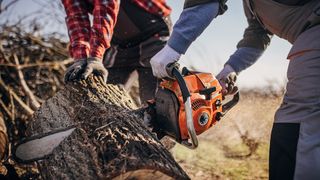Tuning a chainsaw ensures that it runs well and does the best job possible for you, and runs smoothly and safely. Be aware that many modern models should only be worked on by qualified maintenance technicians, and if you are in any way uncertain about carrying out any work on your chainsaw it is always best to consult a professional. However, here we get some advice from experts in their field on how to tune a chainsaw, along with some other important maintenance tips for keeping the best chainsaws (opens in new tab) in tip top condition.
How to tune a chainsaw
It’s important to note that new models of chainsaw should only be tuned by professionals. Lisa Tadewaldt is the owner of Urban Forest Pro (opens in new tab) in Portland, OR, and explains: “Tuning a chainsaw means tuning the carburetor so the saw runs correctly. In most modern saws this is done by a computer, and you reset the system by running a series of steps that involve idling the saw and running it full bore. The exact step should be in the user manual for your chainsaw. “For older chainsaws (pre about 2015) there are several screws in the carburetor that need to be adjusted. This is a more expert-level task as adjusting the carburetor incorrectly could ruin the engine of the saw. The most common mistake I see in the field is people thinking they need to tune their saw, when they really need to blow out their air filter.’’ Jeremy Yamaguchi, CEO of Lawn Love (opens in new tab), points out: “Older chainsaws typically have three screws that are responsible for regulating how the chain behaves. “If you can tune it, you want to check three things. Set your saw in idle mode. Pick it up, then tilt it down. If it stalls, you need to tighten whatever screw is the low speed screw on your model. Rev the saw and if it doesn’t rev properly or is slow to come up to speed, loosen the low speed screw. If it screams, you’ll need to loosen the high speed screw.’’ Before starting the tuning process, Dan Akins at Theyardable.com (opens in new tab) says you should check the air filter and replace it with a new one if necessary. He adds: “ The spark arrestor should be checked as well on some models.’’ Adam describes the process step by step. He says: “The whole process only takes about five minutes, but makes a huge difference in your saw’s performance.’’
How to tune a chainsaw: Step by step
- Warm up your chainsaw Prepare your chainsaw by warming it up by running it for 30 seconds. Then, let it idle for another 30 seconds. If the chainsaw stalls while idling, make sure that you tighten the Low Speed screw to reduce the amount of fuel entering the carburetor.
- Rev your chainsaw If your chainsaw, trying revving it. If it hesitates, you’ll want to loosen the Low Speed screw instead. If it makes a squealing noise, this is a sign that you should loosen the High Speed screw.
- Repeat as necessary Keep repeating the previous two steps until your chainsaw is able to rev smoothly for about five seconds.
- Check the chain Lastly, check the chainsaw’s chain. If it’s stationary during idling, then your job is done. However, if it’s still rotating, then adjust the Idler Screw until it is stationary.
What does it mean to tune a chainsaw?
First, we must point out that maintenance is the key to a long and productive life for your chainsaw. Chad Beaty at Northern Tool + Equipment (opens in new tab) says: “Proper maintenance is very important to longevity and performance of your chainsaw. Basic filter replacements and inspection of the spark plug is generally easy to do and should be part of normal routine for the user. As far as tuning a chainsaw - this should only be done by qualified technicians. Keeping your chainsaw clean and staying up on regular maintenance, as well as using Ethanol-free fuel and quality 2-stroke oil mix will keep your saw running and cutting properly for years of service.’’ “Tuning a chainsaw ensures that the engine continues to perform at its best,’’ says Adam Rossi, CEO of TotalShield (opens in new tab). “You tune a chainsaw by adjusting its carburetor - the component that controls gasoline consumption. Readjusting the carburetor also helps to extend the life of your engine by ensuring an even, consistent performance.’’ Jason Farr, president and CEO of Aviara Pavers (opens in new tab), a design and outdoor living specialist company in San Diego, adds: “We often use chainsaws to trim and cut down trees and roots while landscaping and designing outdoor spaces. Frequent heavy work can clog the chainsaw engine. To keep this from happening, you must continuously adjust the machine to work better. “In chainsaws, the carburetor controls the flow of gasoline and air into the engine. By tuning a chainsaw, you can make it run smoother and more efficiently. You can think of it as essential as sharpening an ax for a lumberjack is. “A new regulation requires all saws to be built so that only a qualified technician can tune the carburetor, so some modern saws come with an AutoTune feature. However, if you have an older saw, you’ll need to learn how to tune it.’’ Discover more guides for the garden… Cheap chainsaw deals (opens in new tab) Best leaf blowers (opens in new tab) Best pressure washers (opens in new tab) Cheap pressure washer deals (opens in new tab) Best patio heaters (opens in new tab) Best inflatable hot tubs (opens in new tab)

